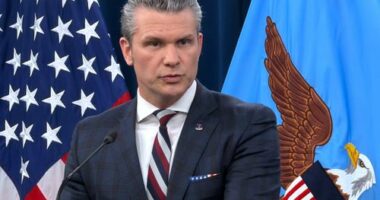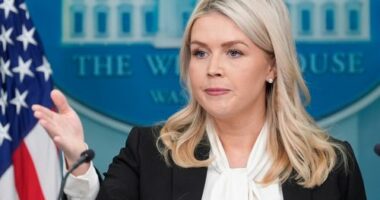Share this @internewscast.com
As Air Force One descended toward Tel Aviv, a colossal display on the city’s beachfront caught the eye. Spanning the length of three football fields, the installation featured a silhouette of Donald Trump’s head accompanied by the simple message: “thank you.” This grand gesture was meticulously crafted by the groups Prisoner Families Activists and Comrades in Arms, aiming to express gratitude to the former U.S. President. The installation was strategically placed to be visible not only to the former President but also to helicopters ferrying released Israeli hostages.
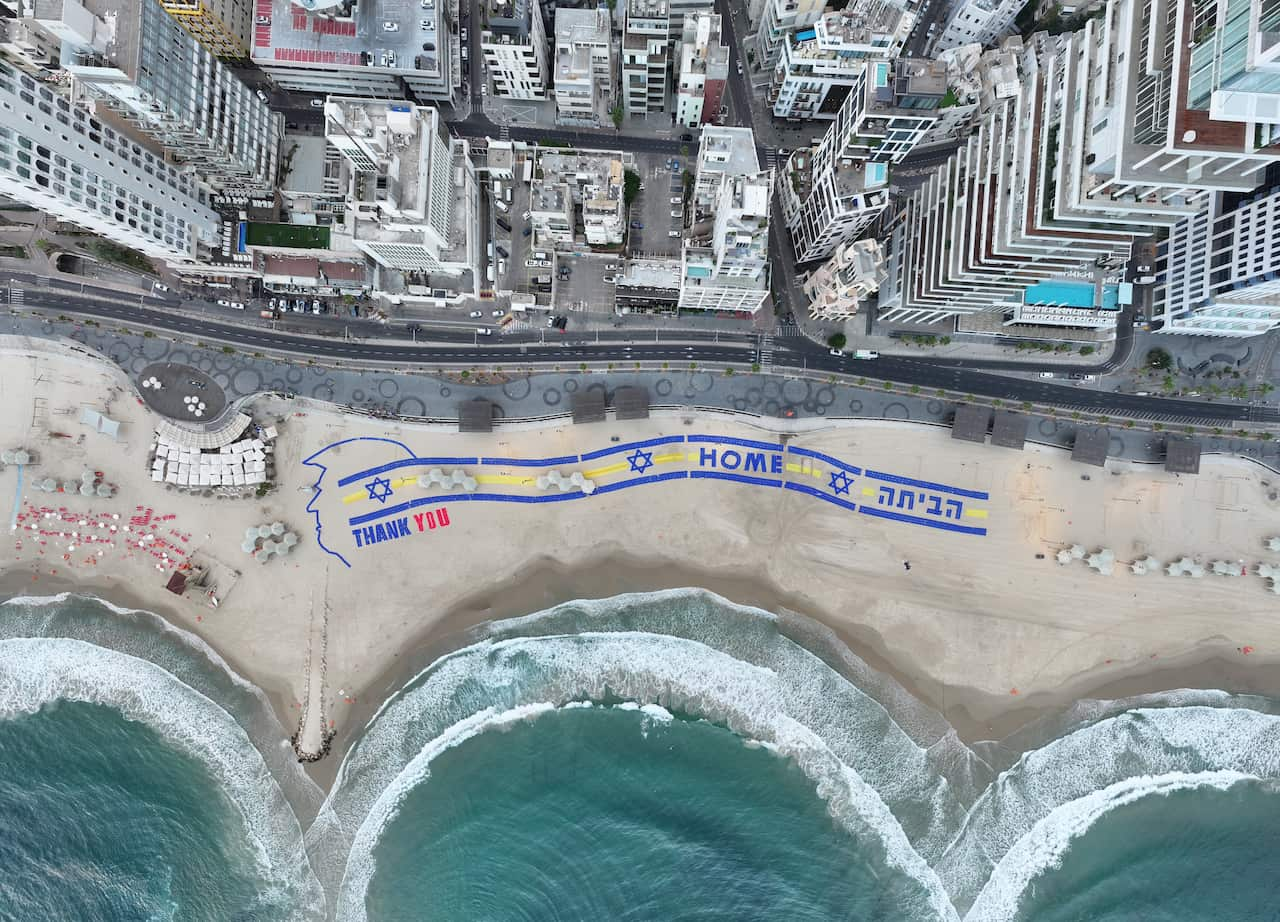
In the halls of the Knesset, Israel’s parliament, Trump’s presence was marked by a speech he delivered on Monday. The event saw some attendees donning bright red caps emblazoned with “Trump The Peace President,” echoing his famous “Make America Great Again” slogan. These caps symbolized the appreciation and hope many held for Trump’s efforts in the region.
Meanwhile, Israeli Prime Minister Benjamin Netanyahu faces a contrasting perception. Some view him as a leader inclined to prolong conflict, a stark divergence from the gratitude expressed towards Trump.
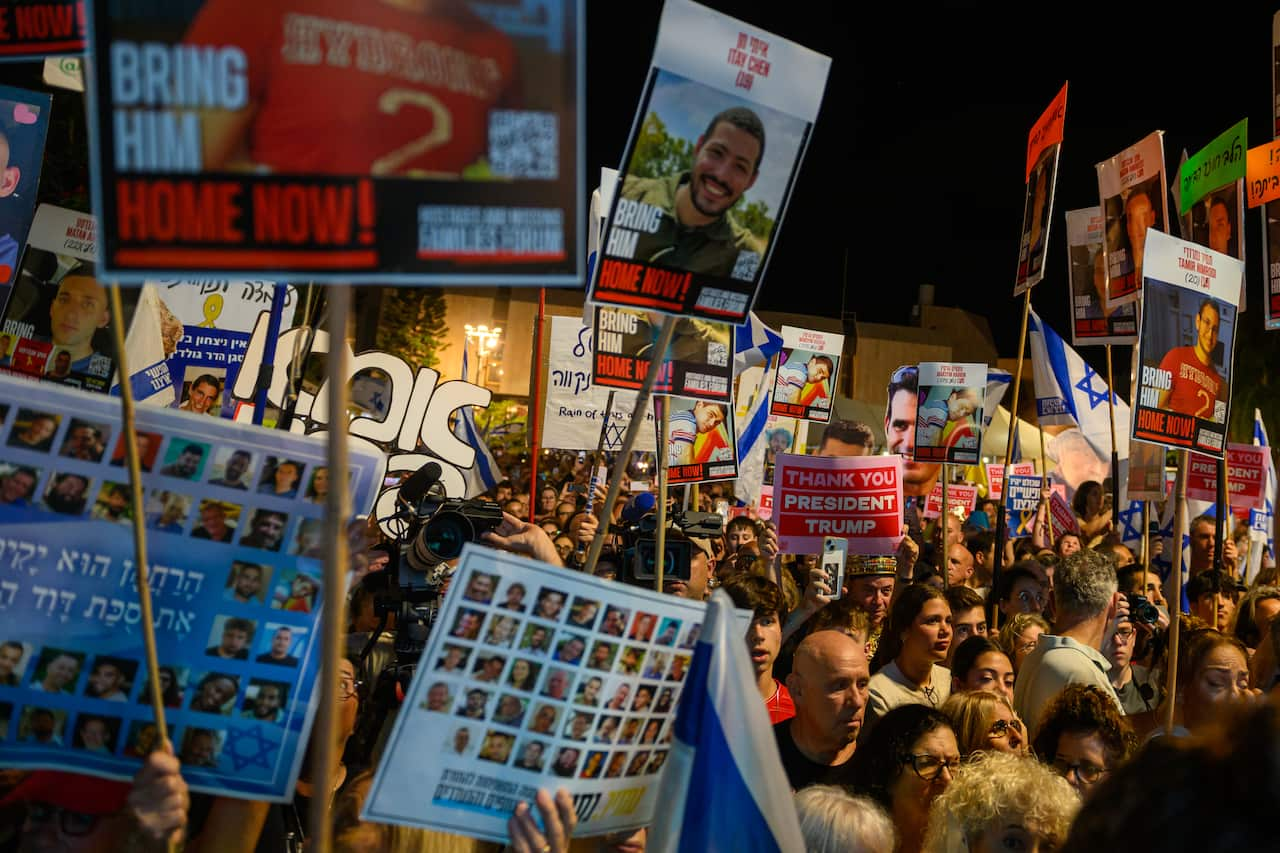
In anticipation of a ceasefire, participants at the weekly Bring Them Home rally in Tel Aviv also voiced their thanks to Donald Trump. The rally, held on Monday, was marked by supporters brandishing signs of appreciation, underscoring the complex and varied emotions surrounding recent events in the region.
“Israelis overlook the fact that the same Trump supported Netanyahu, and his policy, until he reached the conclusion that it was time to end the war,” Rabinovich says.
“Israelis who follow US and international politics were worried by several aspects of Trump’s policies, but this scepticism is now concealed by the wave of enthusiasm that has swept the country.”
‘No American president has done more’
“He’s recognised Jerusalem as Israel’s capital; has brought peace between Israel and three Arab countries; he has stricken Iran’s nuclear sites … and he has blocked hostile decisions at the UN Security Council,” Navon says.
Even Israelis who don’t like his politics and his style recognise his critical role in the liberation of hostages, and they are thankful for that.
Among the actions Netanyahu listed and thanked Trump for was the US recognition of the Golan Heights as Israeli sovereign territory in 2019, but which is considered Syrian territory under international law and illegally occupied by Israel.
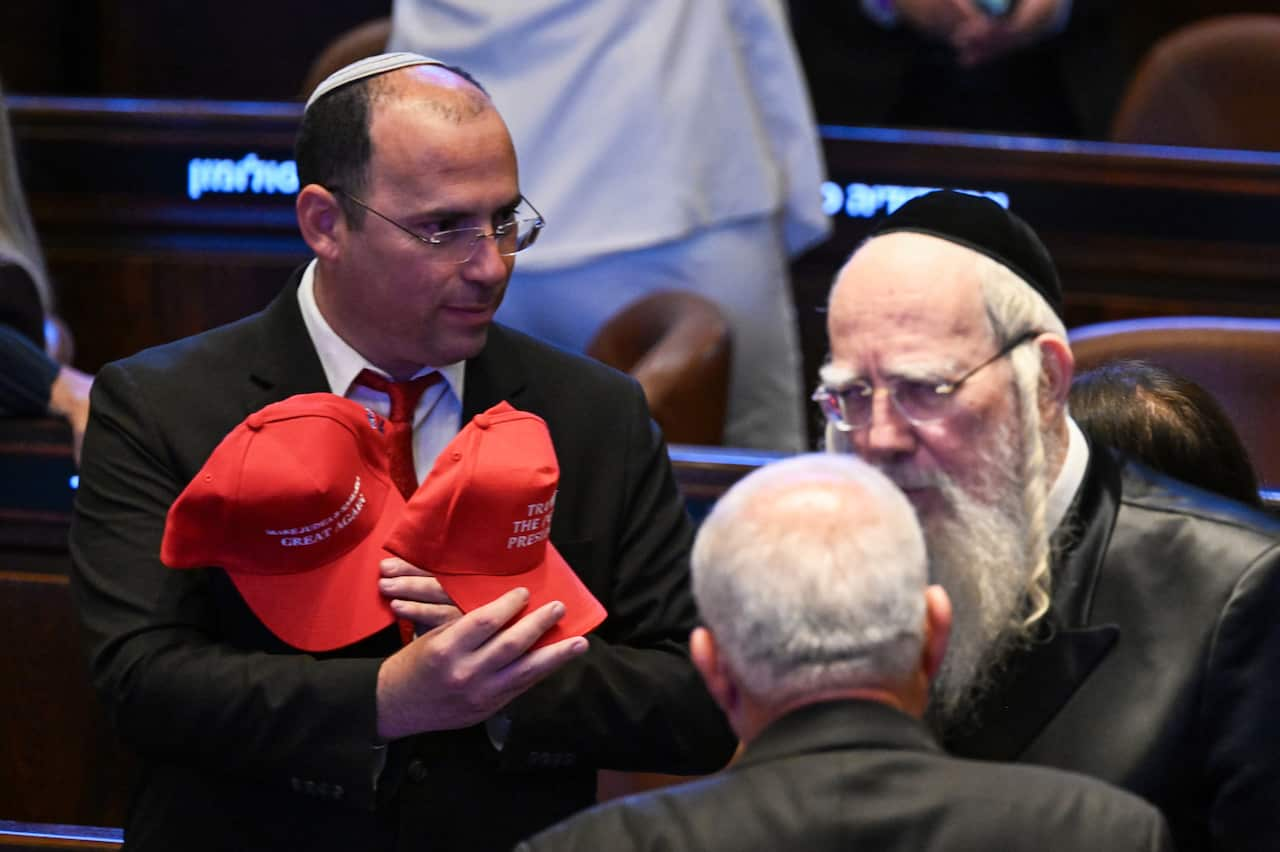
People wore hats that read “Trump The Peace President” inside the Knesset as US President Donald Trump prepared to deliver his remarks. Source: AAP / Kenny Holston/AP
Netanyahu also pointed to the signing of the 2020 Abraham Accords, which led to Israel establishing relations with the Arab countries Bahrain and the United Arab Emirates. Morocco also later signed a similar agreement.
“Thousands of years from now, the Jewish people will remember you. We are a nation that remembers,” Herzog said.
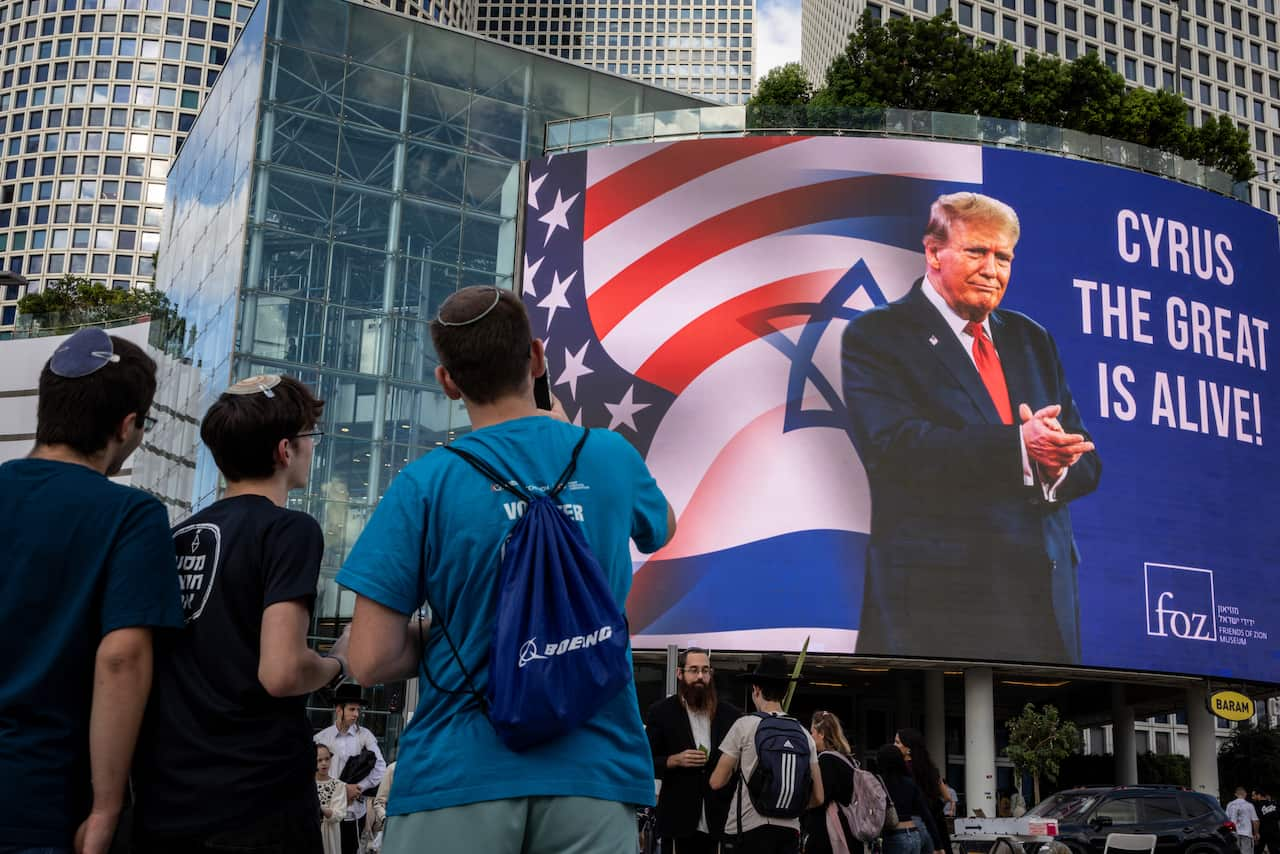
Israeli President Isaac Herzog compared Donald Trump to Cyrus the Great, a Persian king who became a legendary figure in Jewish history for allowing captive Jews to return to Jerusalem from Babylon. Source: Getty / Chris McGrath
In his own speech, Trump acknowledged his personal links to Israel, saying his daughter Ivanka had converted to Judaism before marrying Jared Kushner, who is Orthodox Jewish.
Israel more supportive of Republican presidents
Jared Mondschein, director of research at Sydney University’s United States Studies Centre, says Trump was “uniquely qualified” to broker the Gaza deal partly because he was perceived as being very pro-Israel.
He could go to Benjamin Netanyahu and say ‘Look, you’re not going to get a better deal from anyone else in the US. Take it or leave it’.
Trump’s unconventional approach
These relationships have helped apply multilateral pressure on both the Hamas and Israeli leadership, Mondschein says.
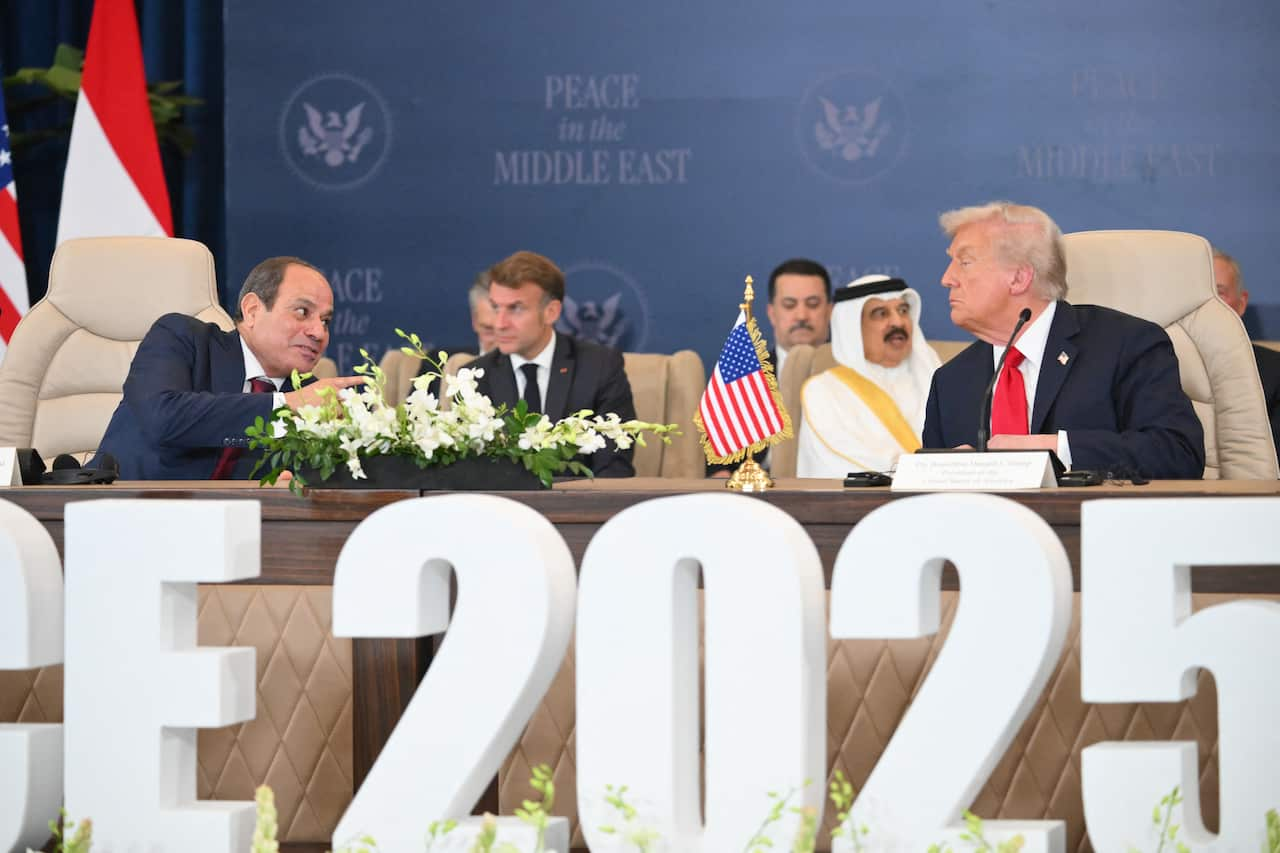
Jared Mondschein, director of research at Sydney University’s United States Studies Centre, says the Trump administration was successful in securing the Gaza ceasefire deal in part due to its unique ties with the Arab world. Source: AAP / Blondet Eliot/ABACA/PA
Mondschein also credits the Trump administration’s unconventional approach, including engaging envoys — real estate developer Steve Witkoff and businessman Jared Kushner— who are not seasoned diplomats.
Kushner, who is also Trump’s son-in-law, has business ties with many Gulf nations. Mondschein says some may consider this inappropriate for an envoy, but it may have built trust among Arab nations.
I can’t emphasise enough how much this unconventional approach to the region has resulted in perhaps more progress than we’ve seen in decades.
“That unconventional approach to the region has again, undoubtedly resulted in a more favourable outcome for Israel, and I would say the region more broadly, because it has, in my view, allowed for more stability in the region as a whole,” he says.
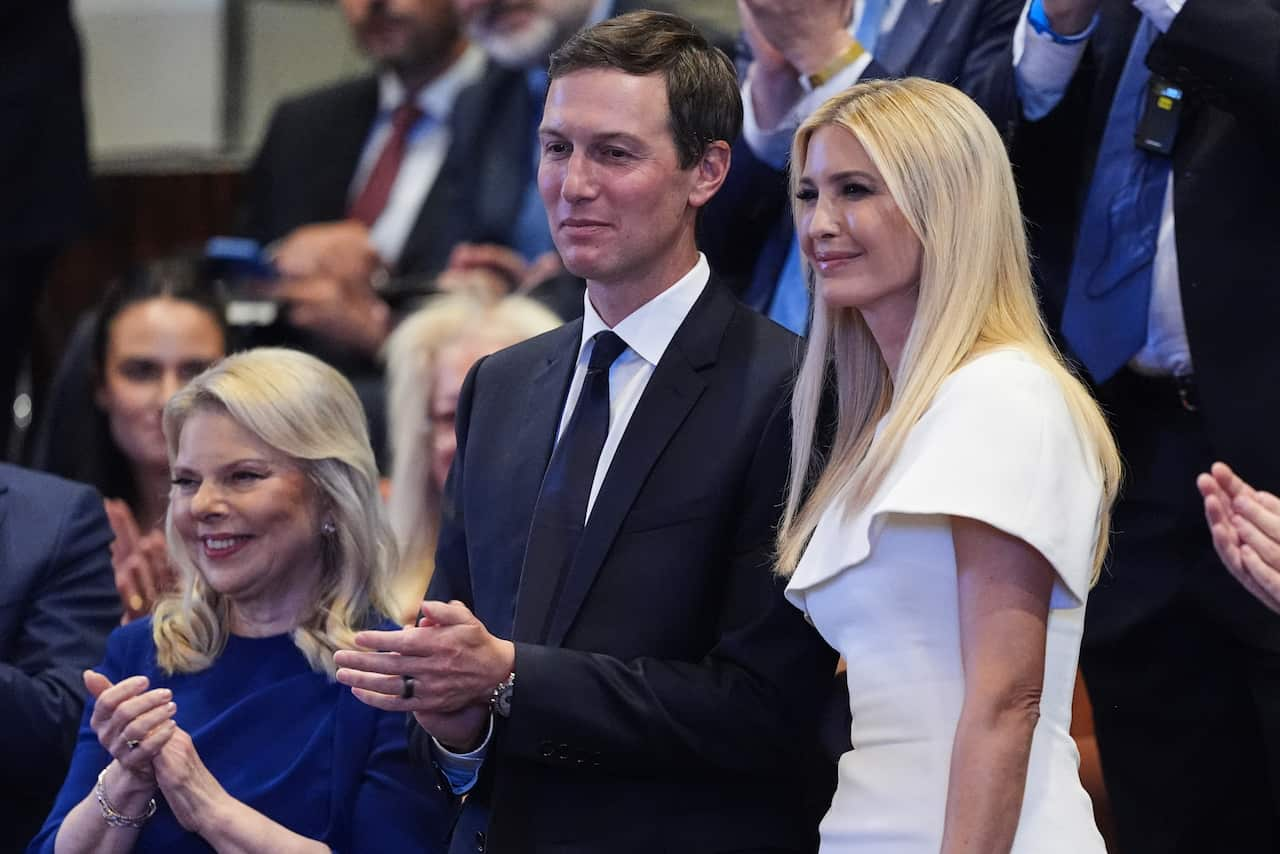
Jared Kushner and Ivanka Trump stand as they are recognised by Donald Trump during his speech to the Knesset. Kushner, along with White House envoy Steve Witkoff, held negotiations with Israel’s Prime Minister Benjamin Netanyahu. Source: AAP / Evan Vucci/AP
‘That’s it, we’ve won’
His own 20-point plan was presented in late September and agreed to by both parties earlier this month, securing the return of the remaining hostages.
During a public rally in Tel Aviv on Saturday night (local time), the crowd cheered when Trump’s name was mentioned but booed when they heard Netanyahu’s.
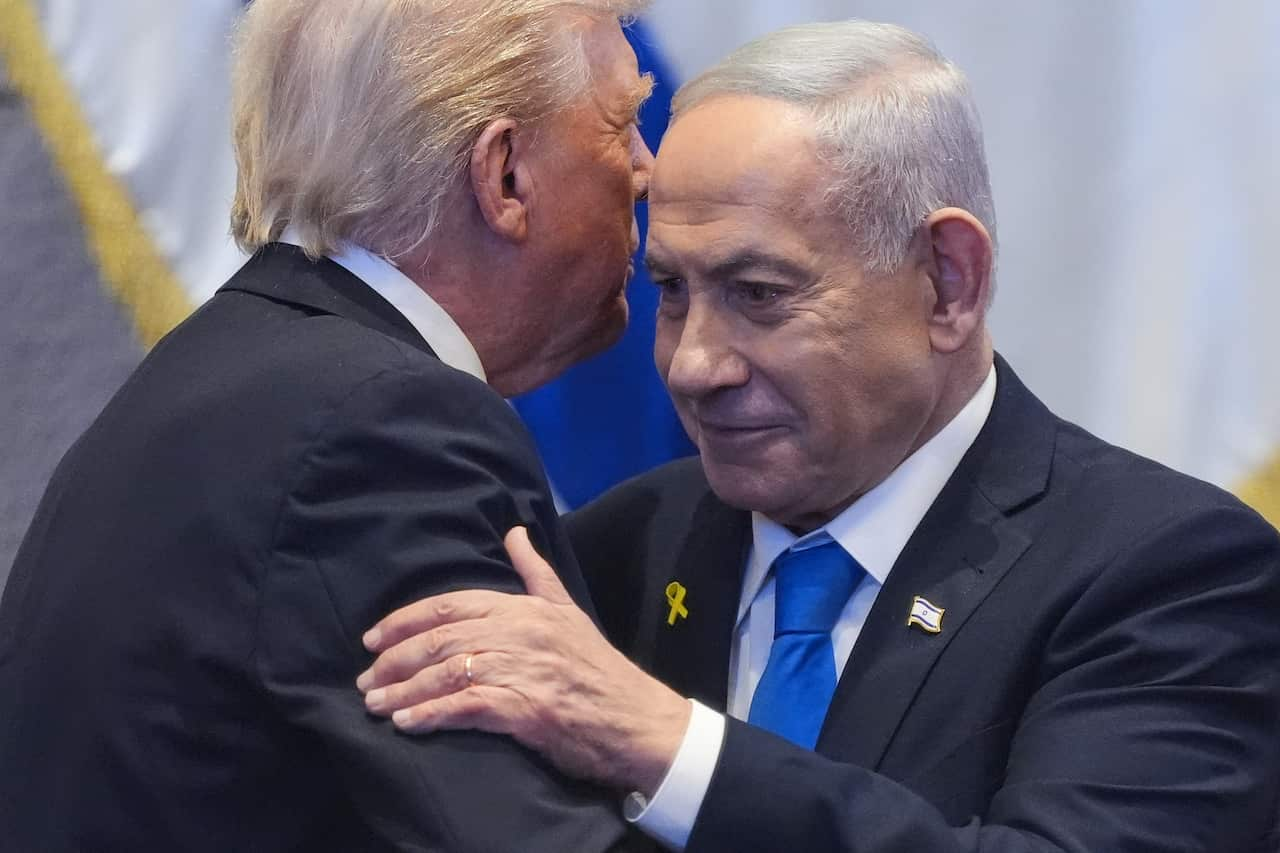
Donald Trump is being given the lion’s share of the credit for the Gaza ceasefire deal. Source: AAP / Evan Vucci/AP
Polling commissioned by Israeli free-to-air TV station Channel 12 and aired in July found more than half of Israelis surveyed thought Netanyahu’s handling of the Gaza war was bad, and 74 per cent wanted hostilities in Gaza to end and for the hostages to come home immediately.
“I think a lot of Israelis were convinced that Prime Minister Netanyahu was prolonging the war for domestic political reasons, whereas they saw Donald Trump as someone who wanted the war to end,” Mondschein says.
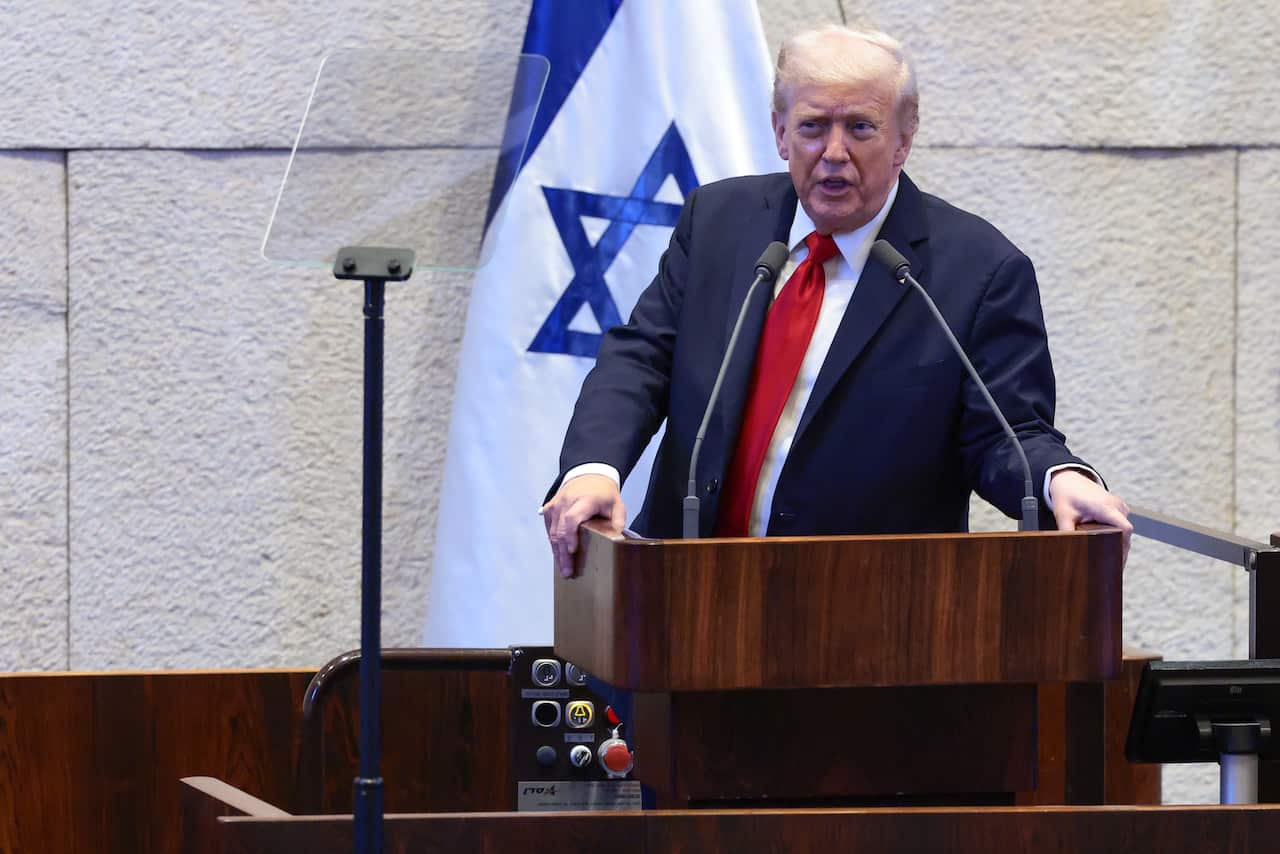
During his address at the Knesset, Donald Trump seemed to affirm this view, indicating he had told Benjamin Netanyahu “it’s now time” for the war to end. Source: AAP / Evelyn Hockstein/AP
In his speech at the Knesset, Trump seemed to affirm this view, indicating he had told Netanyahu “it’s now time” for the war to end.
“I want to congratulate you for having the courage to say ‘that’s it, we’ve won’, and now let’s enjoy our lives and let’s rebuild Israel and make it stronger and bigger and better than it’s ever been before.”
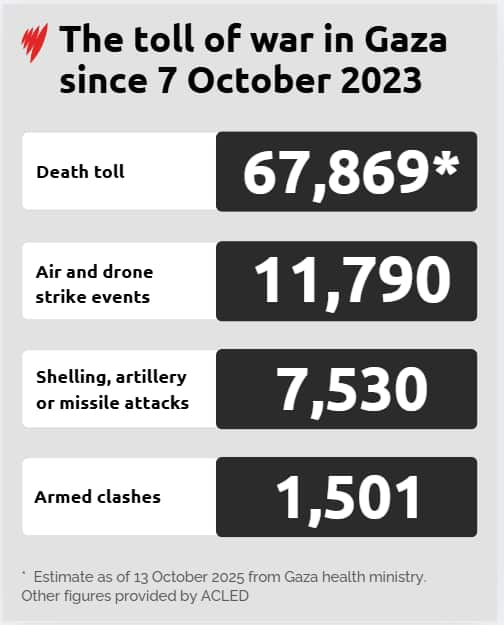
More than 67,000 people have died in the Israel-Hamas war since 7 October 2023 according to the Gaza health ministry. Source: SBS News
Navon agrees Israelis are divided over Netanyahu; they either loathe or admire him, depending on how they perceive his role in the liberation of hostages.
“And it will be for history to judge his overall record.”
Not everyone loves Trump
“This is the banner I waved in front of Trump at the Knesset and was subsequently removed from the plenum,” Cassif wrote.
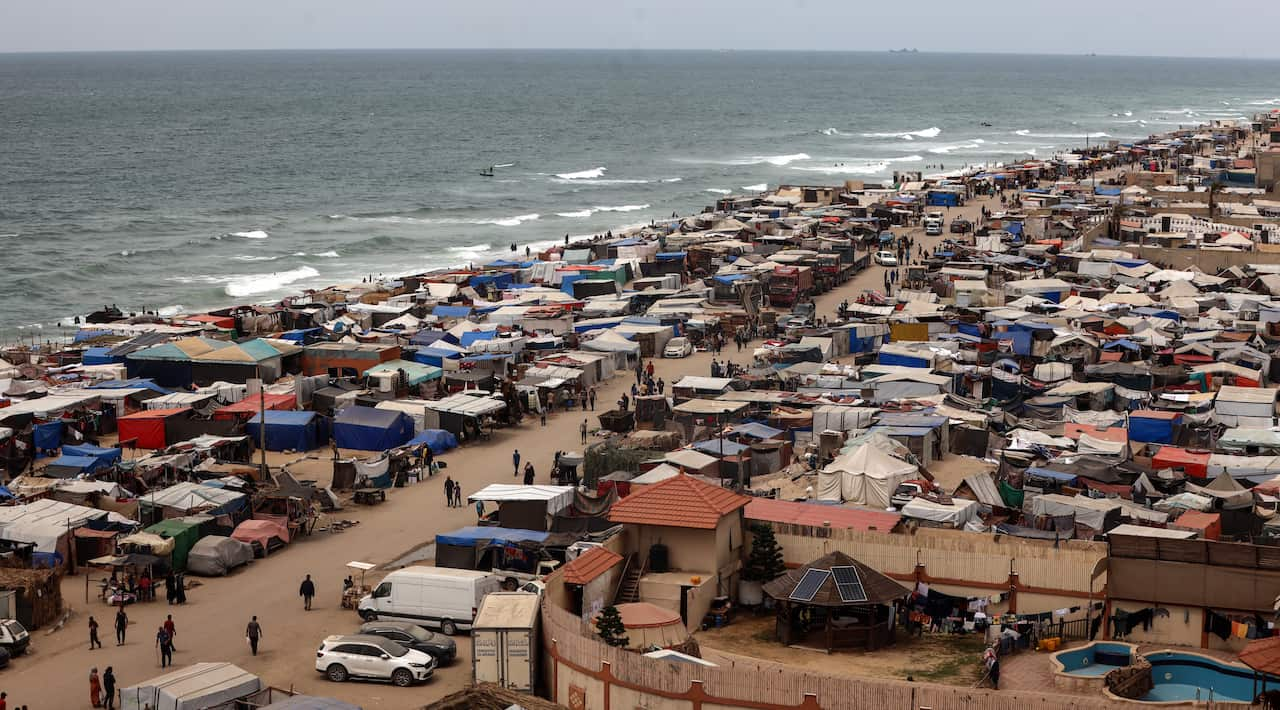
A general view shows tents housing internally displaced Palestinians crowding the beach and the Mediterranean shoreline in Deir al-Balah in the central Gaza Strip, amid the ongoing conflict between Israel and Hamas. Source: Getty / Majdi Fathi/NurPhoto
Mondschein says Palestinians have traditionally not had a favourable view of the US, although no country enjoys majority support among the population.
Before October 7, the Arab Barometer poll found 74 per cent of Palestinians had an unfavourable or somewhat unfavourable view of the US. Six weeks after October 7, 99 per cent reported being dissatisfied with the role of the US.
“Israeli Jews are perhaps less concerned about US domestic issues compared to American Jews, and that’s pretty understandable.”
Is this the dawn of a new era?

Israel’s military said on Wednesday that one of the four bodies it received from Hamas didn’t match any of the hostages that were in the group’s custody. Source: AAP / Mohammed Saber/EPA
“The question is, are we going to enter a new era, or are we simply going back to October 6 of 2023, [when] much of the Palestinian people are seeking economic opportunities, but Hamas is rearming, and Israelis are hoping that the economic opportunities in Israel in particular will disincentivise any attacks? That is the big question,” Mondschein says.
— With additional reporting by Agence France-Presse

